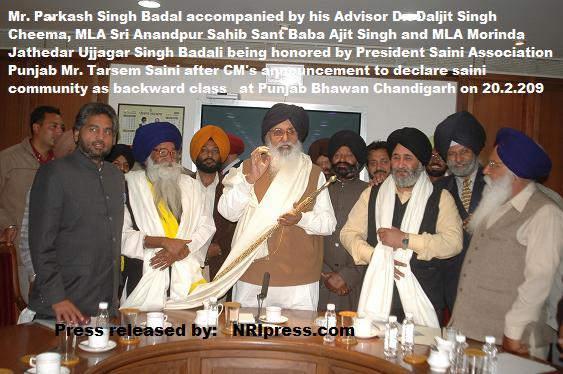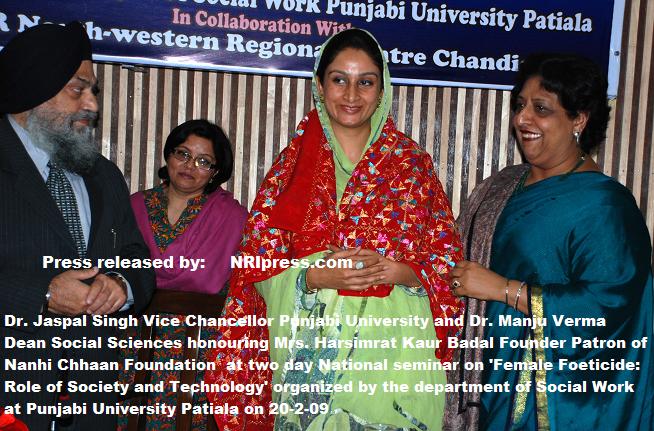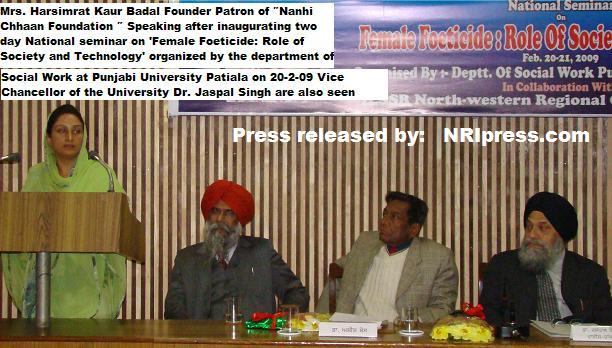NOW Saini Community-
as backward class in Punjab
BADAL DECLARES SAINI COMMUNITY AS BACKWARD
CLASS
Chandigarh February 20, 2009
The Punjab government today declared Saini Community
as backward class with immediate effect. A decision to this effect
was taken by the Punjab Chief Minister Mr. Parkash Singh Badal
while presiding over a meeting of the high powered deputation
of Saini Association, Punjab led by its Chairman Tarsem Saini
here at Punjab Bhawan this evening.

Addressing the members of the deputation, Mr. Badal
said that with this decision the long pending demand of Saini
Community had been conceded. The Chief Minister signed the file,
declaring Saini community as backward class in the presence of
the members of the deputation and asked his Principal Secretary
Mr. D.S. Guru to ensure the publication of notification in this
regard at the earliest.
In his welcome address, the chairman of the Saini
Association Punjab Mr. Tarsem Saini said that the Saini Community
being sincere and hard working to the core had contributed immensely
towards the socio-economic development of the state. He thanked
the Chief Minister for this benevolent gesture and urged him to
get the notification issued in this regard prior to the imposition
of the model code of conduct in wake of forth coming Lok Sabha
Elections.
While expressing the gratitude to Mr. Badal, President
Punjab Saini Cultural Society Harbagh Singh Desumajra said that
the Saini community would be ever indebted to Mr. Badal for this
historic decision which had been ignored by the previous government
despite their numerous requests for this legitimate and justified
demand. He thanked Mr. Badal on behalf of the members of various
associations of the Saini Community who attended the meeting in
support of this demand steadfastly, cutting across the party affiliation.
Mr. Badal was accompanied by his Advisor Dr. Daljit Singh Cheema,
MLA Sri Anandpur Sahib Sant Baba Ajit Singh, MLA Morinda Jathedar
Ujjagar Singh Badali and Principal Secretary to Chief Minister
Mr. D.S. Guru.
Religion can bring lasting change in attitude
against female foeticide –Harsimrat Kaur Badal
Patiala/Chandigarh, February 20
Mrs. Harsimrat Kaur Badal founder patron of `Nanhi Chhaan' and
wife of Deputy Chief Minister S. Sukhbir Singh Badal giving a
call to wage a collective war against female foeticide said that
religion can play an important role in bringing lasting change
in our attitude especially concerning preference for male child.

It may be noted that 'Nanhi Chhaan', the initiative
started at the Golden Temple to give away sampling as 'Buta Parshad'
to newly wedded, expecting women and parents of newly born daughter,
is playing an important role in creating awareness among people
about twin issues of protecting the girl child and environment.
The campaign 'Nanhi Chhaan' also involves giving saplings to women
devotees coming to the holiest Sikh shrines to plant them in their
homes with a pledge to help save the girl child and also the environment
during various historical days' celebrations besides it is a permanent
feature at Golden Temple and Gurudwara Damdama Sahib Talwandi
Sabo. Lakhs of sapling had been distributed till day by the NGO.
'Nanhi Chhaan' is now focusing on involving every religion to
propagate the motives of the organization.

Speaking after inaugurating two day seminar on
'Female Foeticide: Role of Society and Technology' organized by
the department of Social Work of Punjabi University in collaboration
with the ICSSR (North Western) Regional Centre Chandigarh here
today, Mrs. Harsimrat Badal said that it was sad day for proud
people of Punjab that we are having the dubious distinction of
lowest male-female ratio in the country. Every fifth household
in Punjab commits female feoticide. "In our country every
year 5 lakh girl children were restricted to take birth out which
1 Lakh cases were from Punjab", says Harsimrat. She said
that it is matter of national shame for us that we are discussing
on an issue like female foeticide in this era where women were
competitive to men in every field. She said that if things continued
this way boys won't get brides leading to major social crisis
in the society.
Stressing upon the need of educating the girl child, making them
self-dependent Mrs. Badal said that the Punjab Government should
open girls schools nearer to every village, facilitating the education
of girl child. She said that during the summer and winter vocation
of the school, we should organize vocational training of girl
child to increase her employability in the job market and also
empowering here with skills to start self-employment ventures.
Giving a call to fight social menace of dowry plaguing
the society Mrs. Harsimrat Badal said that increasing education,
social awareness about these issues can hold us to tackle these
social problems.
Commenting on the theme of the seminar Mrs. Badal said that it
is shameful that we have commercialized the inventions of science
to selectively kill the female foetus. She said that besides a
strict regulatory system to check the misuse of scientific techniques,
there was an urgent need to strengthen the provisions of PNDT
act, to make this offence deterrent.
Mrs. Badal said that widespread participation from
30 Indian universities, institutions and the NGOs that to from
Kerala in the South, West Bengal and Meghalaya in the North-East
and Gujarat in the West besides Punjab, Haryana, Himachal and
J&K will give us an over view of this problem and an enlighten
us that how these states were handling this social problem.
Addressing the seminar Vice Chancellor, Punjabi
University Dr. Jaspal Singh said that we must make ordinary masses
aware about the message enshrined in Shiri Guru Granth Sahib prohibiting
the discrimination of girl child. He said that the Akal Takht
Sahib, the supreme seat of sikh religion has already issued directives
against the practice of female foeticide.
Prof. Ashish Bose who coined the famous acronym
'Bimaru' states delivered the keynote address The Vice Chancellor
of the University Dr. Jaspal Singh presided over this seminar.
Sh. Krishan Kumar, Director General of School Education, Punjab
and former Deputy Commissioner Nawanshahr known for his Nawanshahr
Model adopted by him to check female foeticide spoke about his
experience.,
The major themes discussed in this seminar were
the Ethical and Development Dilemmas of Female Foeticide, the
Use or Misuse of Medical Technology, the Women' Reproductive Rights
and the application of Section 302 IPC , the Pro-Choice and Pro-Life
Debate over this issue, the Right to Abortion versus Sex-Selective
Abortions in India apart from examining the Effectiveness of Social
Legislations and Profiling the Nexus of Tradition, Technology
and Prosperity. The Emerging Trends in Sex Selection like the
shift from Two-Child to One-Child Norm, From Ultra-Sounds to Non-Medicinal
and Non-Intrusive Methods of Gender Selection like At-Home Gender
Test Kits were also be deliberated upon in this seminar.
GOLDEN CHANCE FOR CANDIDATES OF SCHEDULED CASTE
TO GET ADMISSION IN ITI's FOR VOCATIONAL TRAINING
Chandigarh, February 20, 2009
The Punjab Government was committed to provide better facilities
to Scheduled Castes and Backward Classes in the State. Stating
this here today, Sh. Swarna Ram, Technical Education Minister
said that Technical Education and Industrial Training Department
alongwith Welfare Department has chalked out a comprehensive plan
to provide free vocational Training to candidates of these categories.
The Minister said that under this scheme, training
was imparted to 50,000 candidates every year and about Rs. 125
crores would be spent on this scheme every year. Under this scheme,
in first phase Rs. 4 cores has been released in 2008-09 to impart
training to 2500 students in 13 trades in Government Industrial
Training Institutes for which Admission Notice has already been
given. Second counseling for admission would be on 26th February,
2009. The Minister appealed to candidates of these categories
to avail maximum benefit from this scheme and come forward to
get admission in Vocational Training Courses. Government would
make all efforts to provide jobs to candidates after getting training
under this scheme. Welfare Department informed that Rs. 10 crores
would be earmarked for the year 2009-10 to provide more benefits
under this scheme, he added.
CABINET OKAYS 1320 MW RAJPURA THERMAL POWER PROJECT
APPROVES SLEW OF CONCESSIONS FOR AFFORDABLE HOUSING
CHANDIGARH FEBRUARY 20, 2009
Decks have been cleared for setting up of 1320 MW Rajpura Thermal
Power project at Rajpura with the Punjab Cabinet giving its nod
to the revised tariff offer of Rs.3.309/kWh by the bidder –
Lanco Infratech Ltd.
A decision to this effect was taken in the meeting of the Council
of Ministers chaired by the Punjab Chief Minister Mr. Parkash
Singh Badal here at Punjab Bhawan this morning.
It may be recalled that at present the total power
generation capacity in the state was 6609 MW against the peak
demand of 7428 MW. Perhaps it was the biggest ever initiative
by any state government in the power sector to usher in power
revolution by generating additional capacity of 6480 MW to make
Punjab as a power surplus state within next three years by setting
up four super thermal plants at Talwandi Sabo (1980 MW), Goindwal
Sahib (540MW), Rajpura (1320 MW) and Gidderbaha (2640 MW).
Disclosing this here today a spokesman of the Punjab
government said that the Cabinet also approved a slew of concessions
for affordable housing and relief to the promoters/developers
in response to the memorandum submitted by Confederation of Real
Estate Developers' Association India (CREDAI) and National Real
Estate Development Council (NAREDCO) to the Chief Minister. These
concessions included reduction in government charges (External
Development Charges (EDC), license fee, Change in Land Use) moratorium
of EDC payment, increase in the period for payment of EDC and
waiver of penal interest on delayed payment of EDC installments.
The Cabinet also approved the Special Economic Zone Policy to
facilitate the development of Special Economic Zones in the State
of Punjab to give boost to the economic and industrial development
of the state leading to generation of new employment opportunities.
The SEZ policy would provide a comprehensive framework for establishment,
operation and sustainability of SEZs in the state.
In another significant decision the Cabinet also
approved a comprehensive policy for the survival and revival of
Goindwal industries for the promotion of existing and new industry
there.
The Cabinet also authorized the Chief Minister
to approve the draft of the Governor's Address for the 6th session
of 13th Punjab Vidhan Sabha beginning from 27th February, 2009
and also approved the tentative date-wise programme of the forthcoming
session of Punjab Vidhan Sabha.
The Cabinet also gave approval for amending the
Punjab Government Houses (General Pool) Allotment Rules 1983 for
the allotment of Government accommodation to its employees. The
amended rules would now entitle the government employees to retain
the house till the completion of the academic session of their
children in order to avoid harassment caused to them on account
of mid session transfers. The permissible period for retention
of the house has also been increased from the period of four to
six months. Likewise, the House Allotment Committee would also
now allot a house on out of turn basis to the spouse on retirement
of the government employee provided such spouse was working at
the same headquarter and entitled to the said type of accommodation.
The Cabinet also approved the conversion of the
Punjab Entertainment Tax (Cinematograph shows) amendment Ordinance,
2009 (Punjab ordinance No.1 of 2009) and Punjab Tax on Luxuries
Ordinance, 2008 (Punjab ordinance No.4 of 2008) into Acts through
presentation of a Bill in the forthcoming session of Punjab Vidhan
Sabha.
The Cabinet also approved the enactment of Punjab
Public Records Act 2009 for acquisition of 25 years or more old
records of the various departments of Punjab government and their
proper maintenance, preservation and conservation. This initiative
would enable the researchers to pursue their research works for
their M.Phil and Ph.D thesis and the historians for writing books
which throw light on the historical and cultural heritage of the
Punjab.
The Cabinet also gave approval for the enactment
of the Punjab Preservation of Sub Soil Water Act, 2009 in order
to stop depletion of water level on account of early sowing of
paddy in the month of April and May through the conversion of
Ordinance into Act presentation of a Bill in the forthcoming session
of Punjab Vidhan Sabha.
The Cabinet also approved to increase the official as well as
non-official members in the Punjab Mandi Board under Section 3(1)
of the Punjab State Agricultural Produce Markets Act, 1961 from
8 to 10 in both categories. In light of the amendment the reconstituted
board would now have Chairman, Farmers Commission and Vice Chancellor,
Punjab Agriculture University as two more additional official
members and one member each from the category of licensees under
section 10 of the Act and one from progressive farmers as non-official
members. The newly reconstituted board would also now have the
Director Agriculture in place of Director Animal Husbandry as
an official member.
The Cabinet also considered the new industrial
Policy and to enable the Industries Department to further take
a holistic view before finalizing it, deferred the item to be
brought again in the next Cabinet.
The Cabinet also gave approval for the grant of Rs.1 crore for
the 'Advocate Welfare Fund' to be utilized for the needs of advocates
from time to time.